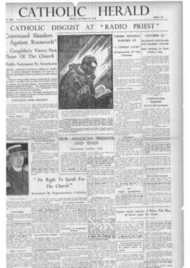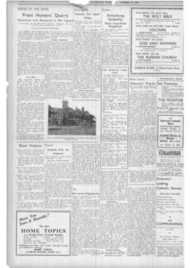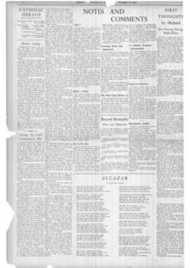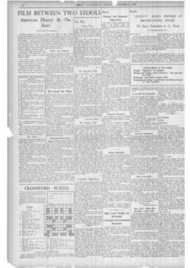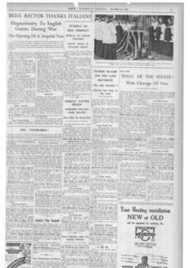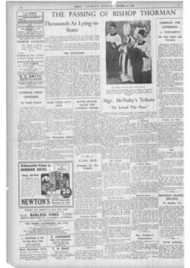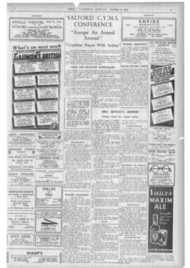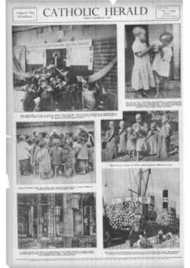Page 7, 18th October 1936
Page 7

Report an error
Noticed an error on this page?If you've noticed an error in this article please click here to report it.
Tags
Share
Related articles
London Blackshirt March Banned
September 22 At Home
The News That Interests
The News That Interests And Matters
The News That Interests And Matters June 18 June 22
The News That Interests and Matters OCTOBER 9 •••■•■•■ OCTOBER 13
AT HOME ABROAD
cast London Tension As a result of the banned Fascist march rough East London tension has increased insiderably. Sir Philip Game, the Police ammissioner, received telegrams from ast London members of Parliament and om the Mayor of Stepney, Councillor irs. Roberts, asking for additional police .otection in the Jewish quarters of East ondon in view of the increase of acts of rrorism directed against Jews. This .quest has been granted and extra patrols ill be on duty in the areas affected beveen 8 p.m. and 2 a.m. A Citizens' ouncil has been formed in order to take eps to counteract acts of terrorism and roteet peaceful citizens. All sections of ast London social and industrial organisaons will be represented on this body. Rowdy scenes occurred again in East ondon when, after a Communist proceson, a party of Fascists attacked various aws. Shop-windows were broken and a
Sr set on fire. Fourteen arrests were lade. Similar disosders occurred during
.a.scist meetings at Bedford, Tunbridge Jells, Liverpool and Edinburgh, where age crowds demonstrated their hostility 3 the marchers.
Special Areas Commissioner
It is announced that Mr. P. Malcolm tewart, Government Commissioner for the pecial Areas, has for personal reasons and rah great reluctance asked to be relieved If his duties as Commissioner from 3ovember 14. His reports were 'vigorous .nd practical, advocating removal of childen from industry in these areas, together vith other energetic measures, and expressng disappointment at the lack of public piril and interest shewn by prominent eaders of industry as regards these areas. His successor is to be Sir George Gillett, prominent industrialist and former M.P. or Finsbury. He was returned as Labour
• epresentative in 1923, joined the National liovernment in 1931, became Parliamentary iecretary to the Ministry of Transport, and was defeated at the last General Election )y his Labour opponent. He comes of a Nell-known Quaker family and has had wide experience of municipal and social Nork.
Ministers and Fascism
Sir John Simon, the Home Secretary, addressing meetings in Spen denounced Fascism and Communism as alien to the British mentality and pursuing what are obviously similar aims. He declared that it was, in his opinion, stupid to take such bodies too seriously or pay too much attention to their activities. As regards the East London march, he stated that, as a democratic minister, he had not got the requisite powers to impose a ban, either upon such a march or upon British Fascists as a political organisation.'
Mr. Ramsay MacDonald, Lord President of the Council, in an interview at Edinburgh, also denounced Fascist provocation and anti-semitism and stated that the Government was seriously considering the question of imposing a •ban upon political uniforms.
Naval Agreement Negotiations
It is known that the British Government has sent a communication to the American and Japanese Governments suggesting that the Governments in question should not build fortifications or aerial bases in the Pacific after the Washington Naval Treaty expires in 1937. This is in accordance with Article 19 of the treaty in question. No answer has as yet been received from either of the two Governments.
Labour Party Conference
Many important questions of policy were discussed during the Labour conference which took place at Edinburgh. The principle of rearmament for the strengthening of collective security was agreed upon, but the actual decision as regards support of the Government's programme was left to the Parliamentary Labour Party. Communist affiliation and a United Front with either Liberals or Communists were decisively rejected. Two Spanish delegates also addressed the conference and made a dramatic plea against non-intervention. They were Senor Jimenez Asua, the wellknown lawyer, and the M.P., Isabel de Palencia, who in the course of her address promised future liberty for Spanish Catho lics. Major Attlee, the leader, and Mr. A. Greenwood, M.P., as a result, went to London to interview Mr. Neville Chamberlain as regards the grave position arising out of the failure to observe non-intervention on the part of certain Powers. A resolution was subsequently passed approving once again the principle of non-intervention, but urging the Government, in the event of continued breaches, to lift the arms embargo.
Non-Intervention Committee
The Soviet Government sent a note to the Committee alleging wholesale breaches of the non-intervention agreement in Spain by Germany, Italy and Portugal, and declaring that unless immediate action were taken to put an end to this it would be compelled to consider the agreement as non-existent. The chairman (the Earl of Plymouth) agreed to discuss the note, but the Italian and German representatives refused to deal with the allegations, declar ing them to be absurd and untrue. The Portuguese delegate adopted the same attitude and walked out of the conference.
New Train Ferry To France
The French Ambassador inaugurated a new train ferry service between Dover and Dunkirk, which commenced on October 15. It will now be possible to travel by sleeping cars between London and Paris without change. A day service in both directions will also commence shortly.
Anglo Russian Naval Treaty
The German Government has sent a note to the Foreign Office in which exception is taken to the concessions made to Russia in the Anglo-Russian Naval Agreement. Failure to secure German approval would make the London Naval Agreement of 1936 invalid.
Secretary for Scotland Dead
The death is announced at Zurich of Sir Godfrey Collins, Secretary of State for Scotland, at the age of 61. After a brief naval career, he entered politics and had represented Greenock as a Liberal since 1910 and as a National Liberal since 1931. His death creates a vacancy at Greenock, where he was returned with a majority of 3,300 over his Labour opponent.
Devaluation
The Czechoslovakian Government, as a result of the Anglo-Franco-American currency agreement, has decided to devalue the Czech crown by a percentage to vary between 10 and 16, to rise or fall according to prevalent currency conditions, The Rumanian, Polish, and Austrian Governments have officially announced that it is not their intention to devalue their cur rency for the present. As a result of Italian devaluation the " tourist lira has been fixed at 100 lira, as opposed to 92. The Yugoslav Government has as yet made no announcement of its intentions. The Dutch guilder, which has not been officially devalued, has settled for the time being in the neighbourhood of 9.20.
Austrian Dictatorship Strengthened
As a result of the growing Heimwehr dissensions and the tension between the rival leaders, Major Fey and Prince Starhemberg, the Austrian Chancellor, Dr. von Schuschnigg, decided to dissolve the Heimwehr, the Ostmarkische Sturmscharen and all other similar bodies. Henceforth Cabinet ministers will be responsible solely to the Chancellor instead of to the organisation of which they might be members. Prince Starhemberg appealed for calm and loyalty to the Government and left for abroad. No resistance is expected. The projected duel between Major Fey and Prince Starhemberg is likely to be banned by the Chancellor.
French Communist Activities
French Communists planned a largescale series of 122 meetings throughout Alsace and Lorraine, but M. Blum's Government banned all but ten of these, thereby causing much anti-Government feeling among French Communists. Various incidents occurred as a result of these meetings, counter-demonstrations being held. Only at Strasbourg and Metz were there clashes of any importance. At Metz various extreme Right supporters besieged Communists in the station for some hours, but even here there was no serious trouble, thanks to the careful behaviour of the police.
Great indignation was expressed by the German Press at these demonstrations, and particularly at M. Thorez's speech at Metz, where he referred to Hitler's assertions in Mein Katnpf of the necessity to conquer France. An official protest is to be made by the German Ambassador in Paris.
League Assembly The League Assembly, before breaking up, decided that the Committee of TwentyEight appointed to examine questions of League reform will meet on December 7,
after the " Locarno " Conference. That was the main problem discussed by the present Assembly, and it is understood that security rather than universality will be the aim of any eventual reform that is likely to be agreed to.
New Danzig Terror
A fresh wave of terror against the Danzig Socialists is now taking place. At least a
hundred and sixty are now in prison and raids upon Socialist households by armed Storm Troopers and other Nazi forces are becoming constant occurrences.
Hungarian Premier Buried
General Goemboes, the late Hungarian Prime Minister, was buried with full military honours in Budapest. Among those present were the Austrian Chancellor, Dr. von Schuschnigg, General Goering, and Count Ciano, Mussolini's son-in-law. Sir Geoffrey Knox represented H.M. The King. The Prince-Primate of Hungary, Cardinal Seredyi, was also present. Fifteen minutes' silence was observed throughout Hungary. Dr. Daranyi is to be General Goemboes' successor and his tendencies will, it is thought, be slightly more liberal.
Spanish Civil War
Recently the Nationalist forces have consolidated their positions in the neighbourhood of Madrid. It is claimed that Madrid's last rail connection has now been cut off and a wholesale offensive against Madrid is likely to commence at any time. Bad weather is hampering both sides in this area. No change is reported on the Aragon front, but Red forces have advanced almost into the Nationalist stronghold of Oviedo, where fierce fighting is taking place, and made limited progress in the Bilbao sector. In Andalusia, at Estepona, near Malaga, a Nationalist attack has been repelled by Red troops with heavy losses, but is likely to be renewed soon. An exchange of hostages is reported between the Nationalist at San Sebastian and the Red forces at Bilbao.
Palestine Unrest
Last week was again marked by isolated acts of terrorism and skirmishes and pitched battles on a minor scale had to be fought by the military, particularly in the neighbourhood of Bethlehem and Mount Carmel.
Owing, however, to the intervention of the Arab kings of the Yemen, Transjordania and Iraq, the Arab Higher Committee has now called off the general strike and Palestine has resumed its normal appearance. It is noteworthy that the Arab claims have not been conceded, but a cessation of terrorism and an improved atmosphere arc hoped for. The Jewish papers are inclined to view with disfavour the intervention of Arab kings in Palestine, as being outside their sphere of influence.
Manchukuo Frontier Incidents
Two new border clashes are reported between Soviet and Manchukuo soldiers. Numerous casualties are said to have occurred and reinforcements are being sent to the frontier by both sides. A protest has been sent by the Manchukuo Government to Moscow and a Japanese protest is also likely.
Philippine Typhoon
A typhoon is reported. from the Philippine islands in which at least three hundred people are known to have been killed and
hundreds more are missing. Eighty-two bodies have been recovered from one town alone. The typhoon raged most fiercely in Luzon Island, from most of which no news have as yet been received. Preparations are being actively made against further floods, which are feared.
blog comments powered by Disqus


